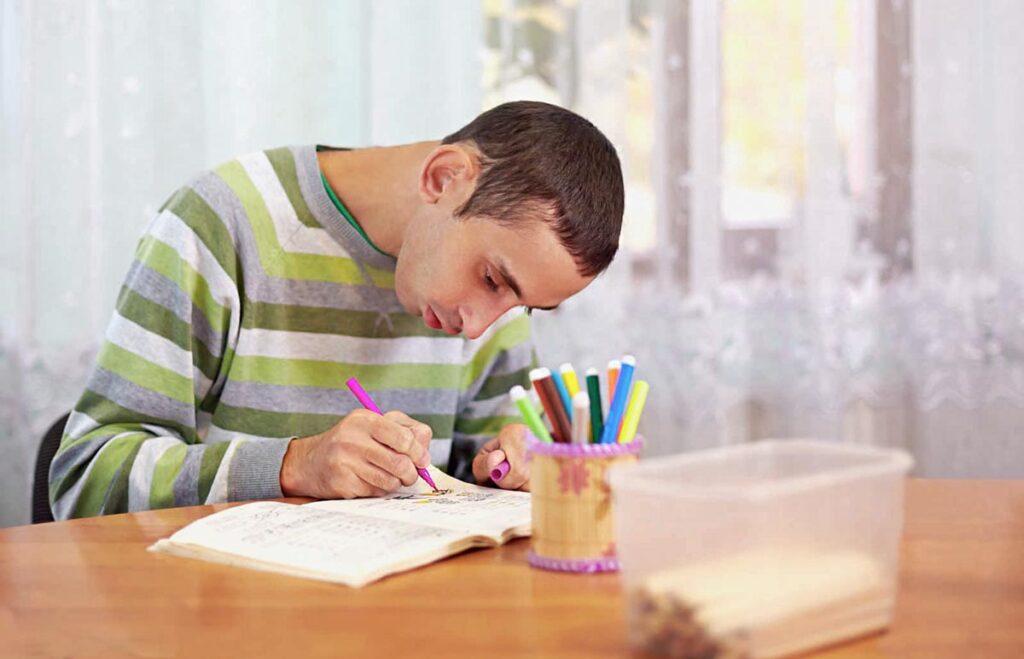Many people go through depressive states at one point in their lives. Their depressive state may be caused by life’s circumstances like sickness, stress, or traumatic event. In some cases, there are no evident causes of depression.
Depression, most times, is seen as an effect of cognitive disorder. This condition is known as diagnostic overshadowing. Some individuals with learning difficulties may not have their depressive symptoms recognised, while others might be wrongly diagnosed.
Depression traits can be linked with underground physical health conditions like hypothyroidism. As a result, health professionals should explore physical health.
Communication Difficulties In Depression
People who have difficulty communicating find it hard to explain the mood alterations. The problem also affects the people around them because of how hard it would be to discover their mood changes. Depression is not always correctly recognised in people that cannot communicate effectively. Especially people that cannot verbally relay their low moods or are incapable of relaying their feelings nonverbally.
There are means of assisting people who cannot recognise their depressive states. These support procedures help the individuals to understand their strengths and weaknesses in terms of communication.

Aids For Communication Difficulties
Diagnosis of communication difficulties is performed by speech and language specialists. They also give suggestions that would help the person communicate their depressive states. When the therapist discovers the kind of support the individual needs, they can provide the following tips:
· Picture Exchange Communication, also known as PEC.
· Sign languages like British Sign Language and Makaton.
· Social articles and other scenario-recommended books.
Assistive technology is also valuable in helping with communication difficulties. With technological improvements, individuals can use smart devices. These devices have software that helps them to communicate appropriately. Some of these software have pictures that enable them to disseminate information to people around them. They can also create sentences that would be spoken aloud on the device. This method of communication is more convenient and practical.
These devices have multipurpose functions aside from reading and creating stories. They can use them for phone calls and video chats to help interact with family and friends far away and avoid social solitude. The use of devices helps the individual and the caregivers. With time, they will understand their situation and know how to help them better.
Signs and Symptoms of Depression In People With Intellectual Disability
There are several signs and symptoms linked with depression. Also, their manifestation differs between people. Some of the signs and symptoms are:
· Anxiety
· Insomnia
· Weight loss or weight gain
· Low moods
· Loss of self-belief
· Lack of decision-making
· Difficulty in concentrating
· Neglactin personal care
· Social isolation
· Imaginations
· Lack of enough sleep
· Oversleeping
· Lack of appetite
· Blame
· Lack of interest in regular activities
· Loss of energy
Usually, individuals with depression do not get involved in social activities. They turn down requests to social gatherings or events. They prefer to avoid their family members, friends, and carers.

Anxiety
People who are depressed often experience anxiety. When they are anxious, they experience fears and worries. They also face bodily irritations like sweating, palpitations, nausea, frequent urination, chest pains, and dry mouth.
Low Moods
Some people with depressive stages often say their depressions are oppressive low or dark moods. Some others say they experience even physical pain. In essence, it is beyond feeling moderately low.
Lack of Interest
Depression comes with the loss of enthusiasm for life. People in depressive states lose their love for hobbies and attractions. Instead of love and happiness, what they feel is trouble and apathy. This state consumes more energy than usual.
Obsessive Thoughts
People with depression are prone to thoughts that obsess them. They also exhibit compulsive behaviours. These symptoms can be discovered during the first periods of depression. Sometimes, these thoughts and behaviours are related to previous traumatic events. Without proper treatments, people might exhibit more repetitive characteristics impacting their safety. There should be checks for any traumatic histories and PTSD in cases like these.

Features Of Depression In People With Learning Disabilities
Depression in people with learning disabilities often comes with different features like cognitive and somatic features. They are explained below.
Cognitive Features
Cognitive features refer to individuals’ distinctive experiences when they cope with depression. Some of them include:
- Lack of concentration
- Decision-making challenges
- Self-criticism
- Lack of motivation
- Feeling of worthlessness
- Lack of self-confidence
- Loss of self-esteem
Some people also have depressive delusions. These delusions are extreme thoughts that occur with hallucinations.
Sometimes, depression is a loss of skills caused by a brain slow down and physical bodily movements.
It is complex to differentiate cognitive features associated with intellectual conditions from depression. Therefore, one needs to be aware of the pre-depressive states of people with depression.
Somatic Features
Somatic features manifest as lack of appetite, weight loss, a feeling of obstipation, etc. In extreme cases, there is a need for emotional and antidepressant therapy. People with somatic depressional features experience most morning challenges, like waking early, sleeping excessively, difficulty dozing off, and short sleep periods. But as the day goes on, their moods get better. This condition is called diurnal mood variation.

Aetiological Factors of Depression
Several factors cause depression. Some of them include:
· Biological factors like physical sickness and genetics.
· Psychological factors like death, loss and abuse.
· Social factors like boredom, relationship issues, poverty, and solitude.
· Autism
Unfortunate Circumstances
Unfortunate circumstances may worsen the dysfunctional state of people with congenital challanges. Some of them include:
- A person may not have the same carers throughout the treatment period, so the new carers may not know how well the person is improving.
- Some people do not identify their symptoms, so they would not know they need to see a doctor.
- Some people do not receive timely treatment reviews because of the supporters’ repeat prescriptions or the health expert’s insensitivity.
- People who eventually see the doctor may not know how to communicate their conditions, and the people around them may not understand what is happening.
- People with these conditions may not be exposed to proper healthcare.
- Some people have diagnostic overshadowing. In this case, the healthcare expert might misdiagnose the depression and relate the symptoms to an intellectual condition instead of depression.
Treatment
Every treatment must follow a due medical process for effectiveness. The first step to treatment for depression is diagnosis.
Differential Diagnosis
Differential diagnosis is a situation where a medical expert distinguishes between two or more conditions that might be the causes of an individual’s depressive symptoms.
Depression can be easily mistaken for other types of conditions. This mixup happens when the symptoms are associated with behaviour. Some health conditions can also cause depression. That is why it is essential to perform a complete and thorough examination if the diagnosis is unclear. Proper inspections are also needed for conditions like endocrine irregularities, body disabilities, epilepsy, etc.

Social support
Support from family members, friends, carers, and medical professionals is vital. The patients need a simple and unambiguous explanation of their condition. It helps them cooperate. Also, community nurses can be very instrumental in the support process.
There is a need for regular physical activity at home or anywhere. It helps to reduce fatigue and disinterest. They should maintain daily routines and keep in touch with family and friends. They tend to have high self-esteem when encouraged to partake in previously enjoyable activities. Also, they should always be encouraged to eat and maintain their weight, which helps restore their appetite.
Their careers should endure to watch out for the following areas:
- Age effects on depression, duration, and response to treatment.
- The possibility of healing.
- The probability of relapse.
- The amount of care.
In essence, treatments for depression should be carried out using a person-centred technique. Treatments must be done based on the needs of every patient. Before any treatment is administered, there should be checks for psychological, social, biological, and relational factors.
While some people may need antidepressants, others may not respond positively. Therapies are also very instrumental. They could be one on one or in a group.












